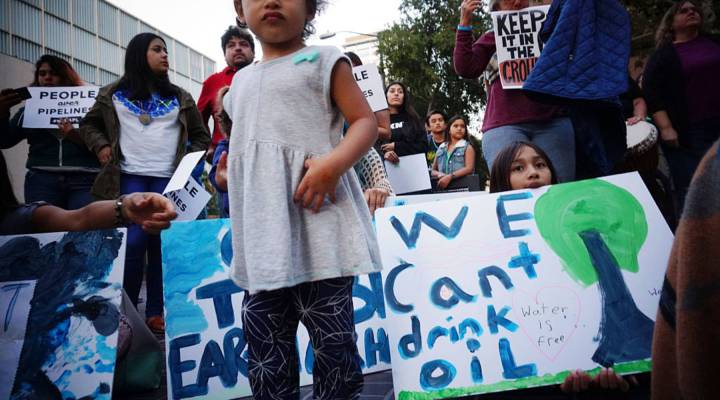
Protests of the Dakota Access Pipeline have momentum

It’s wait and see for opponents and supporters of the Dakota Access Pipeline, a pipeline project designed to move hundreds of thousands of barrels of oil each day from North Dakota’s oil fields to refineries in Illinois.
The pipeline would cross the Missouri River, just above the Standing Rock Sioux reservation in North Dakota. Several Native American tribes have protested the pipeline’s construction, citing danger to water supplies and culturally important sites. They’ve scored a temporary halt and are waiting for decisions on bigger ones. In the meantime, the leaders of the Standing Rock are working to keep momentum going in an effort to bring more awareness to similar plights of other tribes.
“It’s time that indigenous people’s rights are recognized,” said Dave Archambault, chairman of the Standing Rock Sioux tribe.
Archambault was in Washington, D.C., this week, meeting with members of Congress and other political leaders. He said protests were necessary, because his tribe wasn’t included in the planning process.
“We weren’t consulted on this project,” Archambault said. “It was just being ramrodded through this area, and so we’re working at it and we’re exploring everything that we can and exposing all that we can.”
He said the widespread attention and support his tribe has received can be channeled to other indigenous groups.
“The same things that are happening to us happen across the world, when it comes to indigenous people’s lands, waters, rights, he said. “I’ve been visiting with tribes from Peru, and from Brazil and from Ecuador and from Quebec. And everyone of them has a story.”
The future efficacy of similar protests, however, could be lessened because of the Republican Party’s stance on energy and environmental issues.
“It’s energy above everything,” said Daniel Fiorino, director of the Center for Environmental Policy at American University. “So if that means you deregulate, if it means you use whatever authority you have to get around these local protests, you do it.”
Fiorino said at the very least, a change in political seats would mean less sympathetic ears to future group actions.
“It would certainly affect the impact that a protest would have,” he said.
If that happens, we’re likely to see escalation in tactics among organizers. Pamela Oliver, a sociology professor at the University of Wisconsin-Madison, said efforts by supporters of energy development would be met in kind.
“The more aggressively people try to get the law on their side to prevent public involvement, the more public involvement has to get disruptive, if it’s going to have any impact at all,” Oliver said.
Evidence for escalation is already becoming apparent. A coalition of 75 native groups in the U.S. and Canada said it will join the fight if things escalate.
There’s a lot happening in the world. Through it all, Marketplace is here for you.
You rely on Marketplace to break down the world’s events and tell you how it affects you in a fact-based, approachable way. We rely on your financial support to keep making that possible.
Your donation today powers the independent journalism that you rely on. For just $5/month, you can help sustain Marketplace so we can keep reporting on the things that matter to you.


















